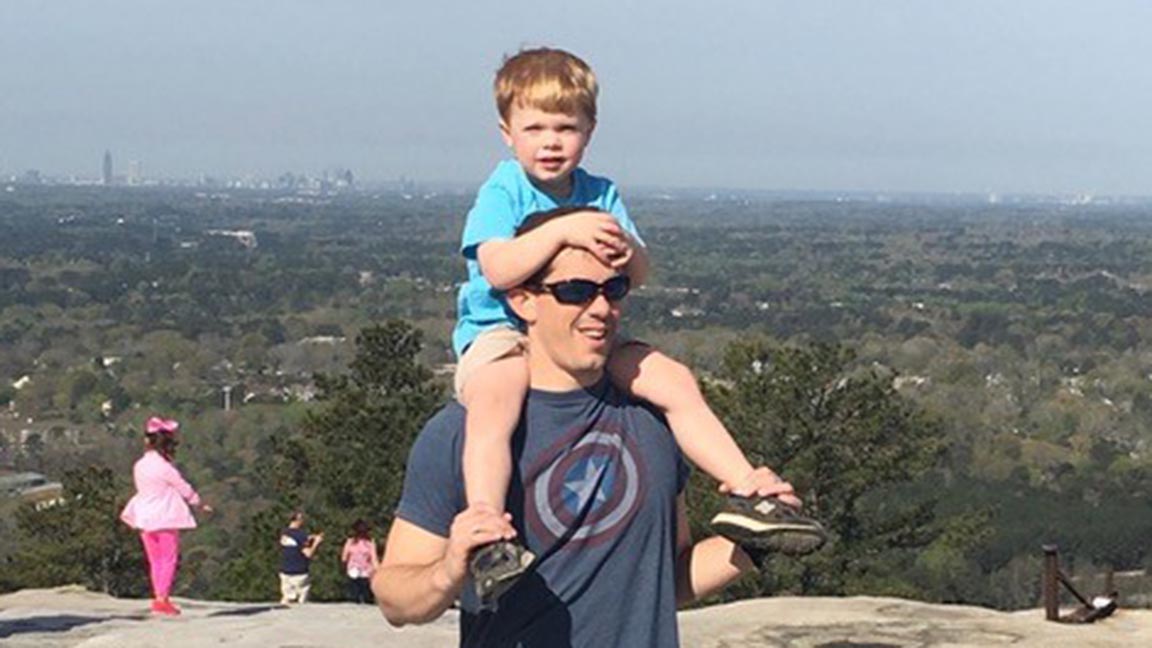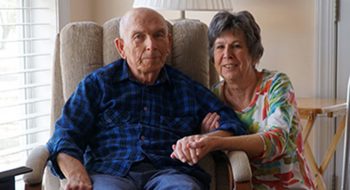It started out as a routine run for Dr. Alex Duvall.
The 39-year-old physician at Tidelands Health laced up his sneakers to run a couple of miles near his Georgetown home before dinner Feb. 1. After about a half mile, he felt some numbness in his left hand. Weird, but he kept up his pace.
Then his music started sounding fuzzy – must be bad earbuds or interference, he thought.
“I thought, ‘I’m fine’ and kept going,” Dr. Duvall said.
But his body didn’t let him get far. His left leg got so weak he ended up falling in bushes. Luckily, a bystander helped him up. A determined Dr. Duvall still tried to make it back to his house, but collapsed by the side of the road. He finally used his cell phone to call his wife, who – despite his slurred speech – understood enough to call 911 and help EMS find him along Willowbank Road.
Dr. Duvall – seemingly the epitome of good health with his exercise and eating habits – had suffered a stroke.
“At first it was a little bit of denial – I’m too young,” he remembers thinking as the warning signs worsened along his run. “You kind of rationalize those things. And I wasn’t thinking clearly. I don’t think it was fully registering.”
Any age
A stroke, the third-leading cause of death in South Carolina, occurs when a clot blocks the blood supply to the brain or when a blood vessel in the brain bursts. Many assume only folks 65 and older have strokes – they are more common in older people and the risk increases with age – but strokes can occur at any age.
Just this week, 52-year-old actor Luke Perry – the Generation X heartthrob known for his role as Dylan McKay in “Beverly Hills, 90210” and more recently as the dad on “Riverdale” – died five days after a having a major stroke. The news took many of his fans and others by surprise because of his age.

Dr. Alex Duvall with his wife, Claire; daughter Lydia, 10; son Luke, 7; and son David, 4.
But the numbers of young adults having strokes has increased in recent years. Some speculate that risk factors such as obesity, high cholesterol and high blood pressure might be contributing to the increase, but there could be a variety of contributing factors.
“Stroke does not discriminate. Even infants have strokes,” said Brooke Reidel, a stroke certified registered nurse who is the stroke and sepsis program coordinator at Tidelands Health. “It’s getting younger and younger. It can happen anytime, anywhere at any age. We’ve treated people in their 20s, 30s, 40s and all the way up.”
Stroke increasing among younger population
While most of the stroke cases at Tidelands Health are among older patients, cases among those 65 and under are growing, Reidel said. Tidelands Waccamaw Community Hospital and Tidelands Georgetown Memorial Hospital are designated advanced primary stroke centers through The Joint Commission. About 36 percent of strokes treated at Tidelands Georgetown last year were among people 65 and under. About a quarter of strokes treated at Tidelands Waccamaw were among those 65 and younger.
Reidel often leads community talks educating residents about stroke, and she regularly hears the same response from some of the younger adults in the crowd.
“Oh, it’s not going to happen to me. I’m too young for this,” Reidel said. “But that’s not the case.”
Reidel encourages people of all ages to know the warning signs of a stroke and reminds them to act FAST – Face drooping, Arm weakness, Speech difficulty, Time to call 911.
Younger adults shouldn’t panic because stroke numbers are increasing, but should eliminate risk factors such as high blood pressure and high cholesterol and make sure they are exercising. About 80 percent of strokes are preventable by managing the risks, Reidel said. Other risks you can’t control, including age and genetics.
“You need to be aware,” she said. “We need to take it upon ourselves to make sure we are doing everything we can to prevent a stroke.”
As word of Dr. Duvall’s stroke spread through the community, many assumed it had happened to his father – also a physician – not the younger doctor.
Time is brain
Dr. Duvall displayed many of the typical signs of a stroke – including numbness and weakness in his arms and legs, difficulty speaking, trouble walking and a loss of balance. Getting quick care is crucial to increase chances of survival and lessen the damage caused by a stroke. Patients who make it to the emergency department within three hours of their first symptoms have fewer disabilities three months later compared to those who received delayed care.
Dr. Duvall was fortunate to get treatment quickly. The ambulance took him to the emergency department at Tidelands Georgetown Memorial Hospital – where he’s usually the doctor, not the patient – and the team gave him thrombolytic drugs to help dissolve blood clots and help recovery after a stroke.

Dr. Alex Duvall out fishing with his 10-year old daughter Lydia.
After 90 minutes of care there, a medical helicopter took him to the Medical University of South Carolina in Charleston, where he would undergo a thrombectomy to clear the clot. He stayed at MUSC for the next four days. Tests determined Dr. Duvall had suffered a right middle cerebral arterial stroke.
“Unbeknownst to me, I had a clotting disorder,” he said.
Today, Dr. Duvall is healthy and back at work treating patients in Georgetown. He now must take blood thinners for his condition, but is grateful for the quick action and the medical technology available today.
“I was fortunate,” Dr. Duvall said. “You have these assumptions about who gets these types of things… life is precious.”
Dr. Alex Duvall
Family Medicine Physician, Tidelands Health Family Medicine at Georgetown
Medical Education
Education
University of South Carolina School of Medicine
Residency
Self Regional Healthcare, Family Medicine
Internship
Self Regional Healthcare





